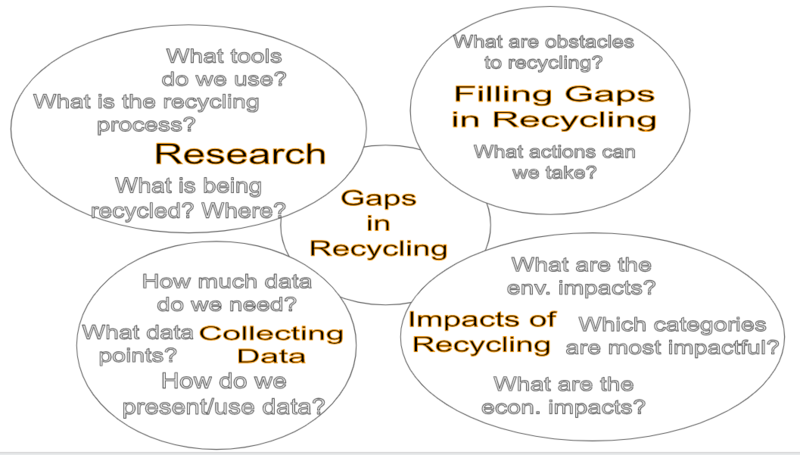Introduction:
We are 8th grade students at Brother Martin High School in New Orleans, Louisiana. As students, we will research recycling where we live to make sure the environment is healthy and clean. We would like to figure out if there are gaps in what is recycled based on the categories of recyclable materials, and how we could help to fill those gaps.
Our main concern:
Our main concern is that New Orleans does not do their part when it comes to recycling, and that our community does not recycle all categories of recyclable materials as much as we could be. If all categories of recyclable materials are not recycled evenly, this could harm the environment.
Obstacles and supporting information:
New Orleans is recycling much less than the average city. This is bad for Louisiana because it is surrounded by Wetlands, and not recycling causes effects upon this environment. Our obstacles for categorizing recycling is that every community is different and they may have different policies, rules, and concerns surrounding recycling. Also, there is a general criteria for recyclables and what is, and isn't recyclable but there are also more specific rules within the criteria. Recycling will be hard to research because it will be difficult to compare different recycling policies to see where the gaps are in ours. To find what is and what is not being recycled, is still a challenge. Another challenge is determining why people don't recycle or what stopped them from recycling.
Who is engaged in this concern?
Many groups have done work on recycling in New Orleans. A group of Tulane students made a machine that turns glass bottles into sand and groups like Public Lab have done work monitoring the effects of trash in New Orleans. To our knowledge, there hasn't been local work on what is and isn't being recycled, or how we could recycle more.
What are the initial questions?
What are local recycling policies?
How is recyclable waste categorized?
Are some categories of recyclable waste recycled more than others in our community?
What categories of recyclable waste are being littered?
Which areas of our community are recycling and which are not?
Which categories of recyclable waste are most important to recycle?
What materials are being made with our community's recycled material?
What are the reasons that members of our community are not recycling?
Does recycling fluctuate throughout the year?

[gaps-in-recycling]

1 Comments
UPDATE!
Summary: Our goal is to figure out what the gaps in recycling are and why. We will propose a solution on the ways we can help with this issue that is rarely talked about. New Orleans, as a city, recycles much less than other cities in the U.S. We used sites to brainstorm Ideas for local environmental issues. We then picked the gaps in recycling in New Orleans and figured out ways in small groups on what ideas and methods that we could use to help improve our environmental Issues. We then found our own different websites by ourselves to try to see how other people around the world are dealing with the same problem and how they are addressing it. We held 126 interviews with friends and family to collect data on what they do, and do not recycle and how often they recycle each category. The questions we asked: - Do you recycle Paper/cardboard? - Do you recycle plastic? - Do you recycle glass? - Do you recycle Aluminum? - Do you recycle E-waste?
We created a spreadsheet with all of our data and used charts to express the data in an insightful way. We discovered that except for paper, cardboard, and plastic, most people don't recycle the other items, showing a huge disparity between the items. According to our data, E-waste is our biggest gap in recycling, followed by glass.
RESEARCH (Background information on Recycling)
IMPACTS OF RECYCLING: It can Reduce Consumption of Raw Materials It can help prevent Air and Water Pollution It can cause Less Waste for Landfills It can create jobs for people https://www.recyclingbins.co.uk/blog/environmental-impacts-of-recycling Most recycling trucks and facilities use fossil fuels for energy Recyclable materials are not equal and may require more energy to reuse Contaminated recyclables end up in landfills if they cannot be cleaned https://cleanriver.com/blog-is-recycling-good-for-the-environment-5-impacts-of-recycling/
AREAS WHERE RECYCLING IS AVAILABLE: Curbside Recycling - City of New Orleans - Jefferson Parish - Baton Rouge
Drop off Services for General Recyclables - City of New Orleans - Jefferson Parish - St. Charles Parish - St. John Parish
CHALLENGES TO RECYCLING: - Lack of standardization. - Certain recycling centers have their own policies on what can and cannot be accepted in the blue bin. - Many places don't take electronics. - Access... Some people don't have a local recycling center.
ECONOMIC IMPACTS: - Takes up landfill space, Need Less landfill space, and more recycling. - By recycling it saves Money on not spending money on the Landfill, you need lots of land, and are going to have to pay lots of bills, and money. - When you Recycle you can make so much more with what you recycle, than it being in a Landfill. - When you recycle you are conserving our natural resources, that we can use to make other stuff out of the things you Recycled. - https://www.tceq.texas.gov/p2/recycle/study-on-the-economic-impacts-of-recycling
DATA COLLECTED / RESULTS
Our results show that the most recycled materials are Plastic (Very Often 54.8%) and Paper/Cardboard (Very Often 44.4%).
The gaps in Recycling are: E-Waste (Never 69%, Rarely 21.4%) Glass (Never 36.5%, Rarely 25.4%) . PROPOSED SOLUTIONS
Is this a question? Click here to post it to the Questions page.
Reply to this comment...
Log in to comment
Login to comment.